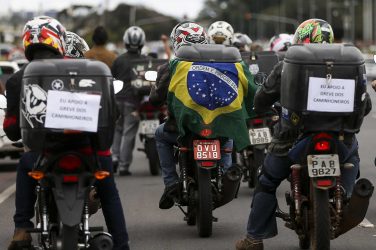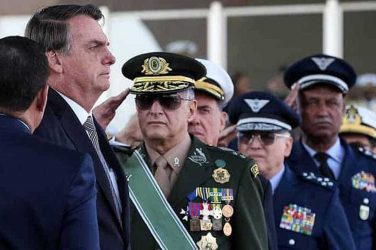
The chaos in Argentina has made many Brazilians
extremely happy. Brazilians think the
Argentineans are
arrogant upstarts who regard themselves as
sophisticated European exiles stranded in
South America instead of what they really are—the
descendants of dirt-poor Italians.
By
John Fitzpatrick
Argentina’s long goodbye has finally arrived and the agony is over—for a brief moment. The end was predictable
and theatrical with the tiny Plaza de Mayo, where Evita Perón used to address adoring crowds, serving once again as a stage
for national drama. It was the same old story. Bare-chested machos fought black-leathered riot police, the besieged
president was whisked off by helicopter from the Casa Rosada palace, cars were set ablaze, shopkeepers opened fire on rioters
and, in a bizarre twist, a Korean couple actually committed suicide after their shop was ransacked.
During the Second World War the Japanese employed Koreans as their prison guards because of their toughness
and brutality. Remember Oddjob? Obviously facing an Argentinean mob on the rampage was a greater test of Korean
national stamina than anyone might have been imagined. So much for the Brazilian cliché that the Argentinean—a
Spanish-speaking Italian who yearns to be an Englishman—has gentlemanly intentions.
The sight of anarchy and mayhem on the elegant avenues of Buenos Aires has made many Brazilians extremely
happy. The Brazilians think the Argentineans are arrogant upstarts who regard themselves as sophisticated European exiles
stranded in South America instead of what they really are—the descendants of dirt-poor Italians who worked in slaughterhouses
on the banks of the River Plate owned by the real aristocrats of Argentina who were the British.
The fact that Argentina currently has top place in the world football ranking is particularly galling to Brazilians
whose current team is pitiful. Whoever becomes the new Argentinean president must be praying that the country wins the
World Cup because this will defuse a lot of tension. (Readers from non-soccer playing countries may find this difficult to
believe but it is true.)
Brazilians, on the other hand, think the whole world loves them and whenever they are criticized become hurt and
angry, especially when the criticism comes from Argentina. For example, earlier this week a demonstration by Argentineans
against the import of cheaper Brazilian shoes was splashed across the front pages of the papers here. The fact that only a
couple of hundred people were involved was ignored by the outraged Brazilian in the street.
Had the Argentineans really be on an anti-Brazil campaign an easy target would have been Banco Itaú’s huge city
center headquarters measuring 50,000 square meters. Brazil has an estimated US$ 8 billion in investments in Argentina yet none
were specifically targeted by rioters or looters. For the average Brazilian, Argentina should be grateful to Brazil, which imports
more than it exports and has even been allowed Argentina to opt out of some of the Mercosul’s free trade rules.
Officially Brazil has reacted calmly to events in its southern neighbor but
one can detect a lingering nervousness. There has been no official gloating,
obviously, and President Fernando Henrique Cardoso was quick to offer “unlimited
support” whatever that means. He also said he would be prepared to intercede
with George Bush to try and resolve Argentina’s problems. Fat chance of that
happening. However, Cardoso was even quicker in saying that Brazil has distanced
itself from Argentina in the eyes of foreign investors and contagion has been
limited.
Factually, he appears to be right. In recent months Brazil has uncoupled
itself from the drawn-out agonies which the ex-economy minister, Domingo
Cavallo, inflicted on his country. The Real has shot up against the dollar,
exports have soared while imports have fallen and foreign investment has risen
much more than had been expected. On Friday, the day when De la Rúa resigned,
the São Paulo stock exchange rose by over 3 percent, the Real lost only a
minuscule 0.25 percent to the dollar and interest rates futures actually fell.
At the same time Brazil lives in the same world as Argentina. Brazil is also a country which is used to sudden ups
and downs. For example, the energy crisis which led to rationing in June arose completely out of the blue and strangled
hopes of GDP growth of 4 percent to 5 percent for 2001. Although a few voices had been crying in the wilderness about the
need for an overhaul of the energy policy almost every individual and company was taken by the surprise.
When the Real was devalued three years ago it was not a controlled thought-out operation but a final admission that
the previous system was no longer tenable. The Real Plan was abandoned in haste. That particular decision was, in
hindsight, a good one and compares with Argentina’s inflexible currency board linking the peso to the dollar. The Asian and
Russian crises also flared up from nowhere and damaged Brazil. In corporate terms you just need to look at Enron, which,
incidentally, had huge investments in Brazil.
Of course Brazil’s economics team is not so naïve as to think that the danger has passed. This week the Central
Bank maintained interest rates at an extremely high 19 percent and even if they fall within the next few months, the reduction
will be academic. Few companies or individuals can afford to borrow at such rates.
One of the lingering dangers is that there is now a power vacuum in Argentina. An interim president from the
(formerly) opposition Peronist movement, Rodriguez Saa, held power for only one week. He had no popular legitimacy or room to
negotiate with any outside body or country. The Peronists, thanks to former president Carlos Menem, were responsible for
introducing the currency board and have little credibility. As the daily newspaper
O Estado de S. Paulo pointed out, the rioting in
Buenos Aires was spontaneously and the protesters were nor supporters of any political party. Thankfully the Argentinean
armed forces have kept their heads down, but it is difficult, at this moment, to see any political breakthrough and the
emergence of a strong future president. Argentina will be a loose cannon for a long time to come.
This brings us to next October’s presidential election in Brazil. Cardoso cannot seek another term and so we cannot
count on continuity. The main opposition (PT— Workers’ Party) has a strong potential candidate in Lula who still heads
opinion polls. Whereas Cardoso’s comments on Argentina were made by a sitting experienced president, Lula could only resort
to his usual crassness. The looting of supermarkets was similar to the looting which the IMF had committed in Argentina
over the last 10 years was his verdict.
Lula dented his credentials once again this month by visiting Cuba and his old mate Fidel Castro followed by a trip
to Venezuela to meet that country’s erratic undemocratic president Hugo Chavez. If Lula has any sense he will learn from
what happened in Argentina. He can gain by pointing out how the IMF’s policies have failed and how the people are
suffering at the hands of anonymous global forces. At the same time he should see that the Brazilian people are looking across
the border at the results of rigidity and doctrine. Lula’s left-wing doctrine will be as unpalatable to the Brazilians as
Cavallo’s economic doctrine was to the Argentineans.
Whoever is the official government-backed candidate—whether the PFL’s Roseana Sarney or the PSDB’s José
Serra—will also have learned from Argentina. Steady as she goes will be the charted course.
John Fitzpatrick is a Scottish journalist who first visited Brazil in 1987and has lived in São Paulo since 1995. He writes
on politics and finance and runs his own company, Celtic Comunicações, which specializes in editorial and translation
services for Brazilian and foreign clients. You can reach him at
Johnfitz@osite.com.br
Send
your
comments to
Brazzil



